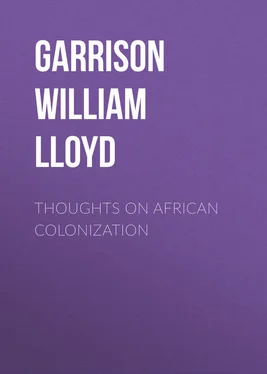William Garrison - Thoughts on African Colonization
Здесь есть возможность читать онлайн «William Garrison - Thoughts on African Colonization» — ознакомительный отрывок электронной книги совершенно бесплатно, а после прочтения отрывка купить полную версию. В некоторых случаях можно слушать аудио, скачать через торрент в формате fb2 и присутствует краткое содержание. Жанр: История, foreign_antique, foreign_prose, на английском языке. Описание произведения, (предисловие) а так же отзывы посетителей доступны на портале библиотеки ЛибКат.
- Название:Thoughts on African Colonization
- Автор:
- Жанр:
- Год:неизвестен
- ISBN:нет данных
- Рейтинг книги:4 / 5. Голосов: 1
-
Избранное:Добавить в избранное
- Отзывы:
-
Ваша оценка:
- 80
- 1
- 2
- 3
- 4
- 5
Thoughts on African Colonization: краткое содержание, описание и аннотация
Предлагаем к чтению аннотацию, описание, краткое содержание или предисловие (зависит от того, что написал сам автор книги «Thoughts on African Colonization»). Если вы не нашли необходимую информацию о книге — напишите в комментариях, мы постараемся отыскать её.
Thoughts on African Colonization — читать онлайн ознакомительный отрывок
Ниже представлен текст книги, разбитый по страницам. Система сохранения места последней прочитанной страницы, позволяет с удобством читать онлайн бесплатно книгу «Thoughts on African Colonization», без необходимости каждый раз заново искать на чём Вы остановились. Поставьте закладку, и сможете в любой момент перейти на страницу, на которой закончили чтение.
Интервал:
Закладка:
'It is true, their operations have been confined to the single object, colonization. – They do nothing directly to effect the manumission of slaves. – They think nothing can be advantageously done in favor of emancipation, but by means of colonization, of which emancipation will be a certain consequence that may be safely and quietly awaited.' – [Mr Key's Address. – Idem, p. 303.]
'The Colonization Society, as such, have renounced wholly the name and the characteristics of abolitionists. On this point they have been unjustly and injuriously slandered. They need no such barrier to restrict them, as the sentiment of Mr Harrison, for their operations are entirely in a different department. Into their accounts the subject of emancipation does not enter at all.' – ['N. E.' – Idem, p. 306.]
'Being, chiefly, slaveholders ourselves, we well know how it becomes us to approach such a subject as this in a slaveholding state, and in every other. If there were room for a reasonable jealousy, we among the first should feel it; being as much interested in the welfare of the community, and having as much at heart, as any men can have, the security of ourselves, our property and our families.' * * * 'Our object is, not to prevail upon the master to part with his slave, for that we leave to his own reflection and CONVENIENCE; but to afford to those masters who have determined, or may determine, to manumit their slaves; provided they can be removed from this country, the means of removing them to a place where they may be really free, virtuous, respectable and happy. – Nothing can be more innocent and less alarming.' – [Review of Mr Tazewell's Report. – Idem, p. 341.]
'The American Colonization Society has, at all times, solemnly disavowed any purpose of interference with the institutions or rights of our Southern communities.' – [Idem, vol. v. p. 307.]
'From its origin, and throughout the whole period of its existence, it has constantly disclaimed all intention whatever of interfering, in the smallest degree, with the rights of property, or the object of emancipation, gradual or immediate. It is not only without inclination , but it is without power, to make any such interference. It is not even a chartered or incorporated company; and it has no other foundation than that of Bible Societies, or any other christian or charitable unincorporated companies in our country. It knows that the subject of emancipation belongs exclusively to the several States in which slavery is tolerated, and to individual proprietors of slaves in those States, under and according to their laws.' * * * 'The Society presents to the American public no project of emancipation .' * * * 'Its exertions have been confined exclusively to the free colored people of the United States, and to those of them who are willing to go. It has neither purpose nor power to extend them to the larger portion of that race held in bondage. Throughout the whole period of its existence, this disclaimer has been made, and incontestible facts establish its truth and sincerity. It is now repeated, in its behalf, that the spirit of misrepresentation may have no pretext for abusing the public ear.' – [Mr Clay's Speech. – African Repository, vol. vi. pp. 13, 17, 19.]
'The Society, from considerations like these, whilst it disclaims the remotest idea of ever disturbing the right of property in slaves, conceives it to be possible that the time may arrive, when, with the approbation of their owners, they shall all be at liberty; and, with those already free, be removed, with their own consent, to the land of their ancestors.' – [African Repository, vol. vi. p. 69.]
' It is not the object of this Society to liberate slaves, or touch the rights of property . To set them loose among us would be an evil more intolerable than slavery itself. It would make our situation insecure and dangerous.' – [Report of the Kentucky Col. Soc. – Idem, p. 81.]
'It contemplates no purpose of abolition: it touches no slave until his fetters have been voluntarily stricken off by the hand of his own master.' – [Speech of John A. Dix, Esq. – Idem, p. 165.]
'What has awakened that spirit of suspicion and enmity which is now manifested by these men in every form of open and active hostility? Can it be attributed to any departure of the Society from its avowed original design and principles? We maintain that it cannot; we maintain that the character of the Society has from the commencement been uniformly the same, and that its proceedings have been consistent with its character. Were or are the design and principles of the Society hostile to the rights and interest of the Southern States? We maintain that they were and are not; but on the contrary, are worthy to be cherished by the citizens of these States, and to be sustained with all their energies as means of their political and moral strength.' * * * 'The free people of color alone are to be colonized by the Society, and whether the benefits of its scheme are ever to be extended to others , is a question referred to those to whom it pertains as a matter of right and duty to decide.' * * * 'The Colonization Society would be the last Institution in the world to disturb the domestic tranquillity of the South.' – [Defence of the Society. – Idem, pp. 197, 207, 209.]
'This Society, here in the outset, most explicitly disclaims all intention to interfere in the smallest degree with the slave population. It is with the free colored population alone, and that too, with their own consent, that this Society proposes to act.' – [Address of the Maryland State Colonization Society to the People of Maryland.]
'To the slaveholder, who had charged upon them the wicked design of interfering with the rights of property under the specious pretexts of removing a vicious and dangerous free population, they address themselves in a tone of conciliation and sympathy. We know your rights, say they, and we respect them – we know your difficulties, and we appreciate them. Being mostly slaveholders ourselves , having a common interest with you in this subject, an equal opportunity of understanding it, and the same motives to prudent action, what better guarantee can be afforded for the just discrimination, and the safe operation of our measures? And what ground for apprehension that we, who are bound to you by the strongest ties of interest and of sympathy, should intrude upon the repose of the domestic circle, or invade the peace and security of society? Have not the thirteen years' peaceful, yet efficient, operations of our Society attested the moderation of our views and the safety of our plans? We have protested from the commencement, and during our whole progress, and we do now protest, that we have never entertained the purpose of intermeddling with the private property of individuals. We know that we have not the power, even if we had the inclination, to do so. Your rights, as guarantied by the Constitution, are held sacred in our eyes; and we should be among the foremost to resist, as a flagrant usurpation, any encroachment upon those rights. Our only object, as at all times avowed, is to provide for the removal to the coast of Africa, with their own consent, of such persons of color as are already free, and of such others as the humanity of individuals, or the laws of the different states, may hereafter liberate. Is there any thing, say they, in this proposition at war with your interest, your safety, your honor, or your happiness? Do we not all regard this mixed and intermediate population of free blacks, made up of slaves or their immediate descendants, as a mighty and a growing evil, exerting a dangerous and baneful influence on all around them?' – [Address of Cyrus Edwards, Esq. of Illinois. – African Repository, vol. vii. p. 100.]
'It was never the intention of the Society to interfere with the rights of the proprietors of slaves; nor has it at any time done so.' – [Address of R. J. Breckenridge of Kentucky. – Idem p. 176.]
Читать дальшеИнтервал:
Закладка:
Похожие книги на «Thoughts on African Colonization»
Представляем Вашему вниманию похожие книги на «Thoughts on African Colonization» списком для выбора. Мы отобрали схожую по названию и смыслу литературу в надежде предоставить читателям больше вариантов отыскать новые, интересные, ещё непрочитанные произведения.
Обсуждение, отзывы о книге «Thoughts on African Colonization» и просто собственные мнения читателей. Оставьте ваши комментарии, напишите, что Вы думаете о произведении, его смысле или главных героях. Укажите что конкретно понравилось, а что нет, и почему Вы так считаете.












